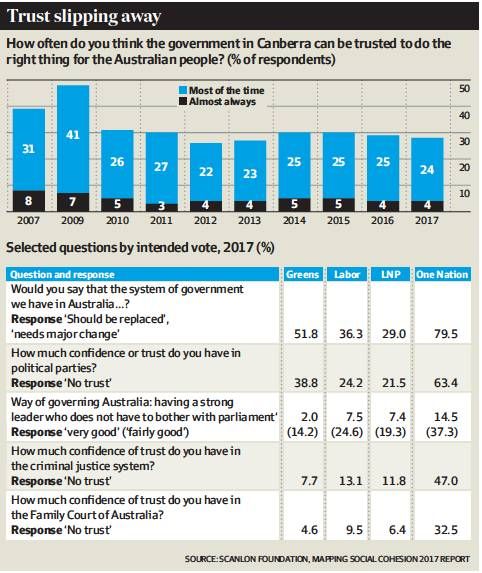Discontented voters are increasingly questioning the value of Australia’s democracy, with more than a third of Australians saying the nation’s political system needs major changes or even replacing.
A substantial minority of voters are even supportive of Australia turning into an effective dictatorship, claiming it would be good to have a strong leader who did not have to bother with parliament.
The findings are contained in the latest survey results from the Scanlon Foundation-Monash University Mapping Social Cohesion program, which has tracked the views of thousands of Australians annually for a decade.
The survey’s focus is on gauging sentiment on immigration, discrimination and cultural diversity but it also quizzes people on political trust.
The latest data shows only 28 per cent trust Canberra to do the right thing by the public, a massive dip from the peak of 48 per cent in 2009. Trust levels are now nudging the depths of the toxic 2012-13 period when Julia Gillard and Tony Abbott went head to head. Just over half of One Nation supporters believe federal politicians ‘‘almost never’’ look after average voters.
This year’s survey found 29 per cent of Coalition voters believe the political system needs major change or replacing, compared with 36.3 per cent of Labor supporters and 51.8 per cent of Greens.
Asked whether they agreed ‘‘having a strong leader who does not have to bother with parliament’’ was desirable, almost a fifth of Coalition supporters thought this was a very good or fairly good idea, almost a quarter of Labor supporters did so and 14.2 per cent of Greens endorsed it.
The research provides a powerful insight into just how deep-seated One Nation voters’ anger is with political elite and institutions.
Almost four in every five One Nation supporters want to see Australia’s political system overhauled, while 37.3 per cent backed the need for a strong leader. Slightly more than half believed Canberra could not be trusted.
The report draws upon separate work by the Pew Research Centre to compare Australians’ dissatisfaction with Canada, which found two-thirds of Canadians trusted their national government led by the charismatic Justin Trudeau. In Australia, the level of trust was at 48 per cent, according to Pew.
Author Professor Andrew Markus described the perceived failures of Australia democracy and increasing support for minor parties as ‘‘developments of potential major consequence for the country’’.
‘‘Trust in democracy is quite low, trust in political parties is almost nonexistent,’’ he said.
Professor Markus said the erosion in trust and other political measures can be tracked alongside Australia’ s recent turbulent political history.
‘‘Trust in democracy collapsed under Kevin Rudd. When he didn’t deliver it plummeted,’’ he said. ‘‘There was no honeymoon for the Liberals when they got into government.’’
The biggest issue facing Australia, according to those surveyed, remains the economy, although this has dropped from a peak of 36 per cent to 26 per cent now. Poor quality of government is second at 10 per cent.
However, sustained low wages growth and fears over job security appear to be taking their toll on sentiment.
While three-quarters of people believe Australia is a land of opportunity that rewards hard work, this is down from 81 per cent a decade ago. The percentage of people who believe they will be worse off in the next few years has almost doubled to 19 per cent in that time. There has been a shift among other hot-button political issues as they fall in and out of prominence.
Concerns about the environment and climate change have fallen to 7 per cent (down from 18 per cent in 2011) and boat people down to 2 per cent (12 per cent in 2012-13), but fears over terrorism have increased to 7 per cent compared to just 1 per cent in 2014.
Support for multiculturalism remains high at 85 per cent.
However, there was substantial illfeeling directed towards Muslims, with 41 per cent of people reporting negative feelings.
